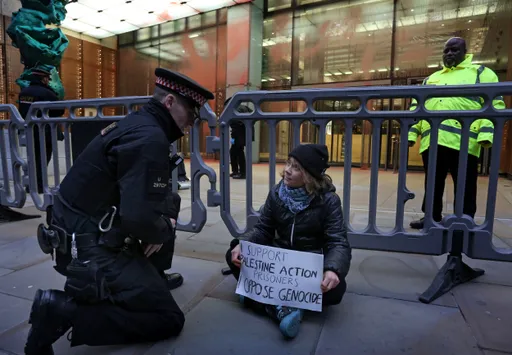As France prepares to mark the 50th anniversary of the civil unrest of May 1968, historians and those who lived it say the spirit of the era is slipping away.
Springing from the occupation of university buildings, the movement soon spread through factories across France, with seven million striking workers bringing the country to a standstill and threatening to topple statesman Charles de Gaulle, by that time in power for nearly a decade.
It also sparked a cultural movement with many of its posters and slogans becoming iconic, celebrated in an exhibition at the Beaux Arts art school in Paris, timed to coincide with the anniversary called, Images in the fight: the visual culture of the far left in France (1968-1974).
Among those who came to admire slogans on Friday (April 27) was Sarah Makowski who was a 20-year-old philosophy student at the Sorbonne campus of Paris university in May 1968. She was caught in the mayhem, when the police were called in to clear the university buildings on May 4.
"I remember I hid in the hall of a building – and what really hit me was the noise. Because there was this incredible silence but there was the sound of the boots on the tarmac which was awful," she said.
Apart from its concrete impact on work conditions – the minimum wage went up by 35 percent in the aftermath of the protests – May 68 is also credited with a lasting social impact, as curator of the exhibition Philippe Artieres explained.
"In people's perception their relationships with those in power ... changed. Or at the very least they're up for discussion, nothing goes without saying any more," he said.
Fifty years on, French President Emmanuel Macron is facing his own form of social unrest with students and railway workers among those who are opposing his reforms, many dreaming of a "convergence of struggles" uniting disparate sectors with different grievances to make their voices heard, as happened in 1968.
Philippe Martinez heads the hardline CGT union and although he accepts that the labour market now is very different from 1968, he said the way the movement unfurled across the country, taking over sector by sector over time, is a lesson for today's protest movement.
But the context was different and this year's protests do not yet show any signs of causing serious disruption in the private sector.
Artieres says society has changed and that is reflected in urban geography. Whereas in 1968 Paris was an industrial city where workers and students crossed paths, now he said different sectors of society have less interaction.
Makowski and her husband Gerard also point to the lack of unity in the air and say they will go to the annual May Day march, scheduled on Tuesday (May 1), but that they do not expect to stay long.
"The street doesn't exist anymore, there isn't that culture of protest, people don't believe in it anymore." Gerard said.
























